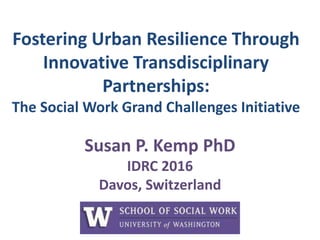
Urban Resilience Through Transdisciplinary Partnerships
- 1. Fostering Urban Resilience Through Innovative Transdisciplinary Partnerships: The Social Work Grand Challenges Initiative Susan P. Kemp PhD IDRC 2016 Davos, Switzerland
- 2. Presentation Outline • Grand Challenges for Social Work Initiative: - Create Social Responses to a Changing Environment • Implications: New research and practice partnerships
- 3. Grand Challenges for Social Work Initiative (AASWSW*) Ambitious yet achievable goals, focused on deeply significant social problems, that: • mobilize the profession • foster scientific and practice innovation • connect social work to other efforts targeting the same issues • create significant societal impact http://aaswsw.org/grand-challenges-initiative/
- 4. National co-chairs: Susan Kemp PhD, University of Washington: spk@uw.edu Lawrence Palinkas, PhD, University of Southern California: palinkas@usc.edu http://aaswsw.org/grand-challenges-initiative/
- 5. Priority Areas • Disaster preparedness and response • Environmentally induced migration and population displacement • Equity-oriented, socio-ecological urban resilience policies and interventions • Proactive engagement and inclusion of marginalized and vulnerable communities
- 6. Resilience: A Socio-Ecological Approach “…a multidisciplinary concept that explores persistence, recovery, and the adaptive and transformative capacities of interlinked social and ecological systems” (Elmqvist, 2014) Elmqvist, T. (2014). Urban resilience thinking. Solutions, 5, 5, 26-30.
- 7. “Reducing social vulnerability must go hand in hand with efforts to increase ecological resilience.” (Shi et al., 2016) Shi, L. et al. (2016). Roadmap towards justice in urban climate adaptation research. Nature Climate Change, 6, 131-137.
- 9. Seattle’s Resilience Challenge* • Inequality • The risk of catastrophic earthquakes *100 Resilient Cities: http://www.100resilientcities.org/#/-_/ *http://www.100resilientcities.org/cities/entry/seattles-resilience-challenge#/-_/
- 13. “resilience is…an… opportunity to (re)imagine a more just future for all”
- 14. The Social Ecology of Urban Resilience: Community Priorities* • Affordable housing/displacement • Wages/jobs (economic insecurity) • Food insecurity • Health: individual, family, community • Racial equity & justice • Participation and representation: voice Got Green/Puget Sound Sage (2016), Our people, our planet, our power: Community led research in South Seattle. http://gotgreenseattle.org/
- 15. Create Social Responses to a Changing Environment: Core Strategies 1. Adaptation/refocusing of social work roles and interventions: e.g., evidence-based psychosocial interventions; community engagement/mobilization; policy advocacy 2. Sophisticated interdisciplinary socio-ecological research: to develop and hone effective strategies 3. Policy advocacy 4. Impact-oriented partnerships - across community, disciplinary, sectoral, and national borders. *Kemp, S. P., Palinkas, L. A., Wong, M., Floersch, J., Wagner, K., …& Nurius, P. (2014). Strengthen the social response to the human impacts of environmental change. Baltimore, MD: American Academy of Social Work and Social Welfare.
- 16. Multidisciplinary Inquiry for Environmental Change: Urban Microclimates in Knoxville, TN Lisa Reyes Mason, Ph.D Assistant Professor College of Social Work Kelsey N. Ellis, Ph.D. Assistant Professor Department of Geography Jon M. Hathaway, Ph.D. Assistant Professor Civil and Environmental Engineering
- 17. Wicked problems defy a single interpretation.
- 18. THANK YOU! Susan P. Kemp PhD spk@uw.edu
Editor's Notes
- Urban environmental justice – interlocking questions of social and spatial justice Cities as pivotal hubs in global sustainability – key sites of both risk and innovation
- Environmental degradation, disinvestment, exploitation
- Urban heat islands (UHIs), air quality, green space, and other environmental parameters can vary Need for smaller scale, localized data (“microclimates” or “microenvironments”) Need for complementary, in-depth information on people’s lived experiences
- Can’t be understood through one lens; not only a business problem or a policy problem or a science problem. Need to bring all fields, from engineering to ethics, ecology to the arts, social sciences and social work, communications and more
